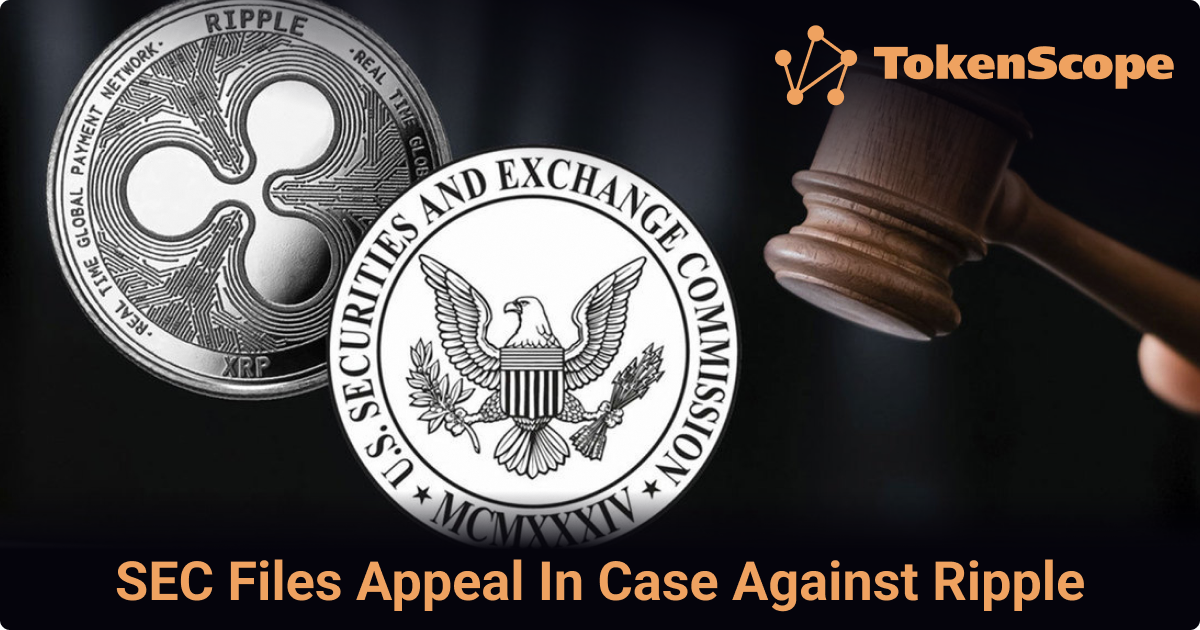SEC Files Appeal In Case Against Ripple

In December 2020 the U.S. Securities and Exchange Commission (SEC) filed a lawsuit against Ripple Labs, Inc., creator of the XRP token, alleging that the company and its executives violated Sections 5(a) and 5(c) of the Securities Act of 1933 by engaging in the unlawful offer and sale of securities in exchange for cash and other consideration worth over $1.38 billion. This lawsuit has significant implications for the cryptocurrency industry and could determine the future of cryptocurrency regulations.
Ripple Labs first appeared on the fintech landscape in 2012 with a promise to provide financial institutions with low-cost and speedy clearance of cross-border money transfers. The company created the RippleNet network, which allows transactions in the form of XRP cryptocurrency to be settled and cleared in real-time. The SEC's lawsuit against Ripple focuses on whether XRP tokens are securities or commodities, which has significant implications for the cryptocurrency industry.
In December 2020 The SEC filed a lawsuit against company, alleging that the company itself and its executives, Brad Garlinghouse and Christian Larsen, sold unregulated securities valued at more than $1.3 billion to the public over the years via their company-offered XRP.
As we have written many times before, in the US, where the legal framework for cryptocurrencies is still lacking, the hottest debates are over which cryptocurrencies can be classified as securities or commodities and which ones cannot. The arguments of Ripple’s defense were focused on that the XRP token is not a security and doesn’t meet the criteria of the Howey test.
The Howey test is a legal framework established by the U.S. Supreme Court in the 1946 case SEC v. W.J. Howey Co. It is used to determine whether a financial instrument qualifies as an «investment contract» and, therefore, a security subject to federal securities laws.
The test consists of four criteria:
- An investment of money
- In a common enterprise
- With an expectation of profits
- Derived from the efforts of others
Ripple argues that XRP does not meet the requirements of the Howey test for the following reasons:
-
No expectation of profits. Ripple contends that it never made any promises or statements to purchasers sufficient to create a reasonable «expectation of profits»;
-
Investor control over profits. Ripple argues that XRP holders have influence over the asset, which would mean it is not a security. According to the Howey test, the investor's control over the profit is a critical factor in determining whether an investment contract is a security.
-
Not an investment contract. Ripple maintains that XRP is a digital asset used for cross-border transactions and not an investment contract, which would exempt it from being considered a security under the Howey test.
In September 2022 the Chamber of Digital Commerce (CDC) filed a «friend of the court» brief on Ripple’s behalf, supporting the company's position that XRP is not a security. The company has also been supported by the crypto community in the US and beyond throughout the proceedings.
In July 2023 U.S. District Judge Analisa Torres ruled that Ripple's XRP sales on public cryptocurrency exchanges were not offers of securities under the law, granting summary judgment to Ripple on some claims by the SEC.
Unfortunately, Ripple's victory in the lawsuit may be considered partial as the judge ruled that programmatic sales of XRP were not securities, while institutional sales were. The lawsuit also involves charges against Ripple's executives, Brad Garlinghouse and Christian Larsen, for selling unregulated securities valued at more than $1.3 billion to the public over the years via their company-offered XRP. These charges have not been resolved and are still pending in the court.
On August, 9 the SEC has announced its intention to appeal the court's decision. The SEC may believe that the court's interpretation of the securities laws and regulations in the recent ruling is incorrect, and seek to present a different interpretation to the appellate court.
The watchdog could also argue that the court's decision creates uncertainty or ambiguity in the application of securities laws to digital assets like XRP, and an appeal could help clarify the legal standards for the industry. Given the potential implications of the Ripple case for the broader cryptocurrency industry, the SEC may want to ensure that the legal principles established in this case are consistent with its regulatory objectives and enforcement priorities.
This means that the legal battle between Ripple and the SEC is not over, and the outcome of the appeal could have significant implications for the cryptocurrency industry and the regulatory treatment of digital assets like XRP.




